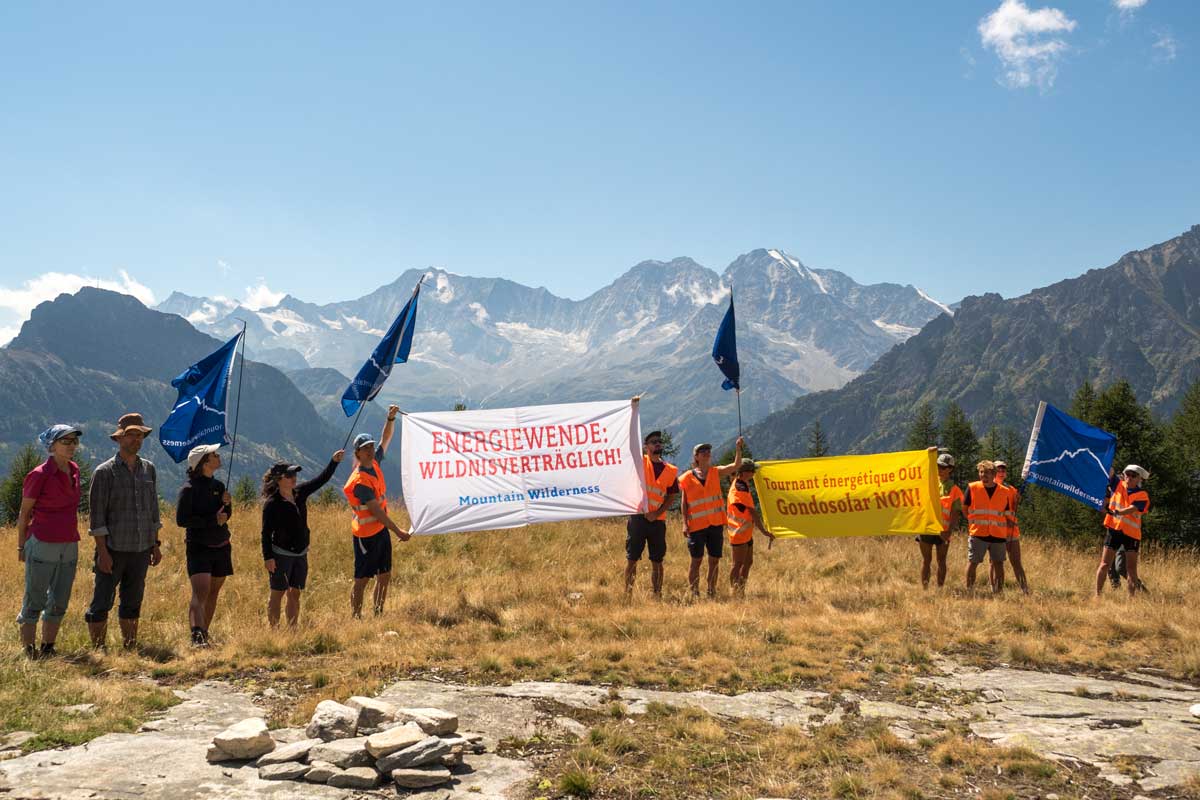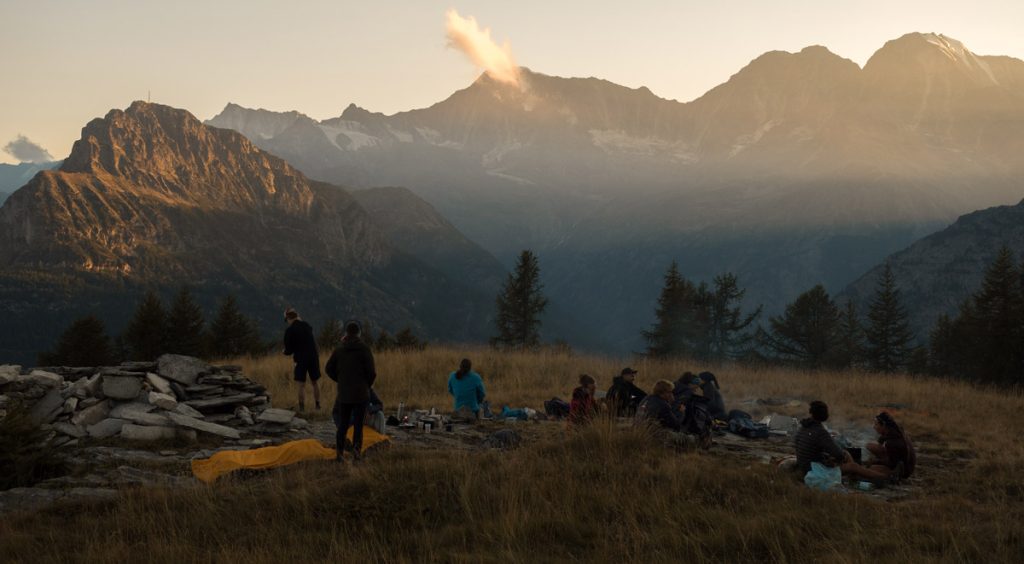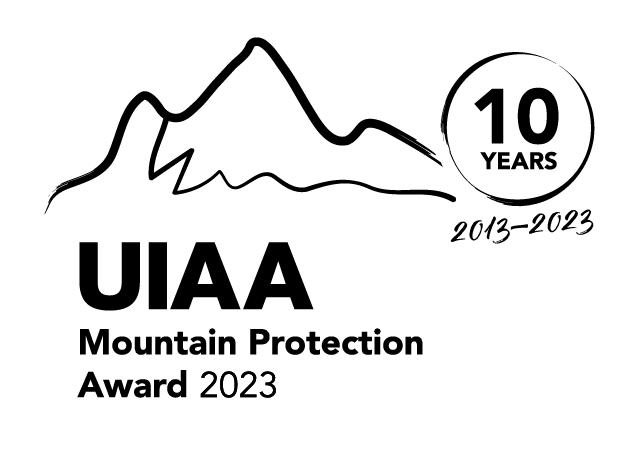2023 MPA Nominee –
Wilderness-Friendly Energy Transition
Energy transition not at the expense of wilderness and biodiversity

Snapshot
The project’s overriding goal is to ensure that the energy transition in Switzerland is implemented quickly, but not at the expense of wilderness and biodiversity. To achieve this, Mountain Wilderness Switzerland works unconditionally for an energy transition that is compatible with wilderness. Wilderness-Friendly Energy Transition aims to further deepen and clarify the knowledge and attitude of Mountain Wilderness and its members and followers in this extraordinary important topic.
View of UIAA MPA Assessor
Not a “hands-on building/cleaning/etc” mountain project, but one that works to change infrastructure and support continuing unimpeded access to the mountains in Switzerland. Thus, it very much supports all aspects of mountaineering in Switzerland. This project brings activism to bear on conservation and sustainable resource management issues. With the production of an instructional video and the presentation of it in the Films for the Mountains panel discussion the group’s activism also has a big educational component.
Vision, goals and aim of the project:
More details on the project + project status as per May 2023
The ‘Wilderness-Friendly Energy Transition’ project, which started in September 2022 and takes a rather activist approach, is helping to ensure that Switzerland achieves the energy transition as quickly as possible, but without destroying the last wild landscapes in the process. Because the Swiss wilderness is threatened by an energy transition that tries to solve the problems with old means: Large power plants in the high mountains instead of a decentralised, community-based energy transition in the already built-up area. The political pressure for the rapid expansion of renewable energies is currently enormous. In contrast to a single-family home or a shopping mall, the alpine high mountains have no lobby of their own. An expansion of renewable energies can therefore be pushed through more quickly and with less resistance in the Alpine region – according to the motto: nobody sees, nobody cares. This leads to the fact that the national protected areas are under severe pressure. This is highly paradoxical in view of the equally urgent biodiversity crisis and the enormous potential for the expansion of renewable energy sources in already built-up and populated areas of Switzerland.
Currently, there are numerous projects in which valuable natural areas should be sacrificed to an unthoughtful expansion of renewable energies. Sensitive glacier forelands such as those on the Trift and the Gorner Glacier are to make way for a new reservoir. Beginning in the fall of 2022, the Parliament’s so-called «Solar Express» will fund alpine solar parks on open space with a total of potentially billions of dollars. For the construction phase of such projects alone, sensitive, intact landscapes would be made accessible by cable cars and altered by power supply lines. Such infrastructure does not belong in high mountains worthy of protection and acutely threatens wild mountain areas.
Intact, wild landscapes make a significant contribution to outdoor sports being so popular. In these landscapes we can relax and feel the rhythms of nature, far from our paced civilisation. Energy infrastructure in remote valleys, on the edge of pristine glaciers or on wild mountain flanks massively disrupts this experience. Undeveloped spaces are industrialised and no longer offer recreation to the same extent. Not to mention that they are harmful for the already endangered biodiversity. The outdoor community therefore has a vital interest in ensuring that we create a wilderness-friendly energy transition!
This is where Mountain Wilderness Switzerland (MWS) steps in. With the overarching vision of mountains being open spaces for nature and people alike, the ‘Wilderness-Friendly Energy Transition’ project’s overriding goal is to ensure that the energy transition is implemented quickly, but not at the expense of wilderness and biodiversity. To achieve this, Mountain Wilderness works unconditionally for an energy transition that is compatible with wilderness. Wilderness-Friendly Energy Transition aims to further deepen and clarify the knowledge and attitude of Mountain Wilderness and its members and followers in this extraordinary important topic.
The present campaign proceeds according to three main purposes:
- Purpose 1: Advocate with a clear strategy and act where MWS involvement as an organization will make a difference.
- Purpose 2: Raise awareness on how important wild spaces are.
- Purpose 3: Encourage and show alternatives.
Key milestones have already been achieved, among which is to clarify the strategy of the overall project, as well as awareness raising campaigns. MWS talks about what no one dares to talk about. As mountaineers and lovers of an intact mountain world, we bear a great responsibility for it. On the one hand, this responsibility relates to own actions in relation to the mountains: How does one travel to and in the mountains? With what material? How does one behave – also towards flora and fauna?
On the other hand, we also bear an indirect responsibility for the mountains: How one lives – also outside the mountains – has an increasing influence on the mountain world. The question is: How much energy does one need to live? The more energy one consumes, the stronger the pressure to produce it in the mountains – in undeveloped, unique wilderness areas.

Organised by

Endorsed by

Further noteworthy endorsements: (1) Valais Society for Wildlife Biology; (2) CIPRA; (3) IG Saglischtal; (4) Patagonia Switzerland

Please note that the content published in this article is courtesy of the Award nominee. The UIAA has made minor revisions to the original submission. To discover more about the UIAA Mountain Protection Award please click here.
